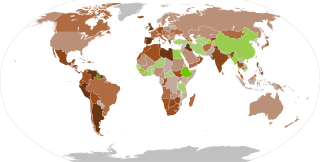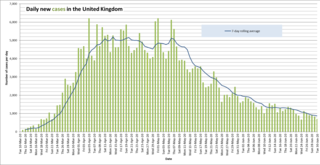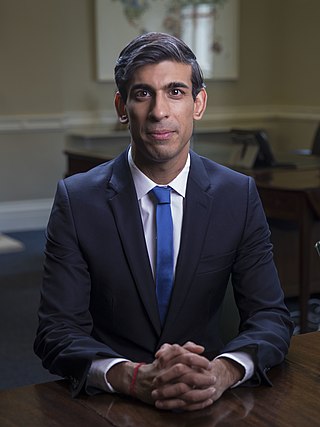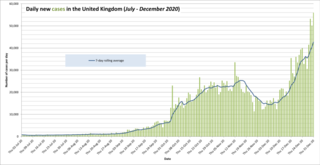A spending review, or occasionally a comprehensive spending review, is a governmental process in the United Kingdom carried out by HM Treasury to set firm expenditure limits and, through public service agreements, define the key improvements that the public can expect from these resources.

Rishi Sunak is a British politician who has served as Prime Minister of the United Kingdom and Leader of the Conservative Party since 2022. The first British Asian prime minister, he previously held two cabinet positions under Boris Johnson, latterly as Chancellor of the Exchequer from 2020 to 2022. Sunak has been Member of Parliament (MP) for Richmond (Yorks) since 2015.

The 2020 United Kingdom budget, officially known as Budget 2020: Delivering on Our Promises to the British People, was a budget delivered by Rishi Sunak, Chancellor of the Exchequer, to the House of Commons on Wednesday 11 March 2020. It was Sunak's first budget, the first since the withdrawal of the United Kingdom from the European Union, the first since Boris Johnson becoming Prime Minister and the first to be held in the spring since March 2017.

The March 2021 United Kingdom budget, officially known as Protecting the Jobs and Livelihoods of the British People was a budget delivered by Rishi Sunak, the Chancellor of the Exchequer in March 2021. It was expected to be delivered in autumn 2020, but was postponed because of the COVID-19 pandemic. It succeeds the budget held in March 2020, and the summer statement and Winter Economy Plan held in summer and autumn 2020, respectively. The budget is the second under Boris Johnson's government, also the second to be delivered by Sunak and the second since Britain's withdrawal from the European Union. The budget was the first for government expenditure in the United Kingdom to exceed £1 trillion.

The COVID-19 recession, also known as the Great Lockdown, was a global economic recession caused by the COVID-19 pandemic. The recession began in most countries in February 2020. After a year of global economic slowdown that saw stagnation of economic growth and consumer activity, the COVID-19 lockdowns and other precautions taken in early 2020 drove the global economy into crisis. Within seven months, every advanced economy had fallen to recession.

In response to the COVID-19 pandemic in the United Kingdom, the UK Government introduced various public health and economic measures to mitigate its impact. Devolution meant that the four nations' administrative responses to the pandemic differed; the Scottish Government, the Welsh Government, and the Northern Ireland Executive produced different policies to those that apply in England. Numerous laws were enacted or introduced throughout the crisis.

The following is a timeline of the COVID-19 pandemic in the United Kingdom from January 2020 to June 2020.

The Coronavirus Job Retention Scheme (CJRS) was a furlough scheme announced by Rishi Sunak, the Chancellor of the Exchequer, on 20 March 2020, during the COVID-19 pandemic in the United Kingdom. The scheme was announced as providing grants to employers to pay 80% of a staff wage and employment costs each month, up to a total of £2,500 per person per month. The scheme initially ran for three months and was backdated to 1 March.

The economic impact of the global COVID-19 pandemic on the United Kingdom has been largely disruptive. It has adversely affected travel, financial markets, employment, a number of industries, and shipping.
Project Birch is the British government's bailout plan to help save companies that are critical to the British economy during the COVID-19 pandemic. It was announced in May 2020. As of September 2020, only one company has qualified for help.

The July 2020 United Kingdom summer statement was a statement from the British Government, or mini-budget statement, delivered on 8 July 2020 by Rishi Sunak, the Chancellor of the Exchequer. It followed the budget delivered earlier in the year, and preceded the Winter Economy Plan. The purpose of the statement was to announce measures aimed at helping to promote economic recovery following the impact of the COVID-19 pandemic. The statement was delivered to the House of Commons, where Sunak unveiled a spending package worth £30bn. Concerns were subsequently raised by organisations including HM Revenue and Customs and the Institute for Fiscal Studies about the statement's impact, as well as its cost-effectiveness, while at least one major retailer declined to take advantage of a financial bonus scheme intended for rehiring employees placed on furlough during the pandemic.

The following is a timeline of the COVID-19 pandemic in the United Kingdom from July 2020 to December 2020.
This is an economic history of the 2020s. Economic history refers to the study of economies or economic events of the past, including financial and business history.

Rishi Sunak served as Chancellor of the Exchequer of the United Kingdom from his appointment on 13 February 2020 to his resignation on 5 July 2022. His tenure was dominated by the COVID-19 pandemic in the United Kingdom, with Sunak becoming a prominent figure in the government's response to the pandemic, giving economic support to struggling businesses through various schemes. He was also involved in the government's response to the cost of living crisis, UK energy supply crisis, and global energy crisis.

Eat Out to Help Out was a British government scheme to support and create jobs in the hospitality industry to counter the economic impacts of the COVID-19 pandemic. The scheme involved the government subsidising food and non-alcoholic drinks at participating cafes, pubs, and restaurants at 50%, up to £10 per person. The offer, announced in July 2020, was available during the month of August 2020, from Monday to Wednesday each week.

The November 2022 United Kingdom autumn statement was delivered to the House of Commons on 17 November 2022 by Chancellor of the Exchequer Jeremy Hunt, after being delayed by three weeks from its original scheduled date of 31 October. The budget addressed the ongoing cost of living crisis, and saw the announcement of a five-year package of tax increases and spending cuts designed to steer the UK through recession. An economic forecast published on the same day by the Office for Budget Responsibility (OBR) stated the UK had entered a recession after experiencing two quarters of a shrinking economy, and predicted the UK's economy would shrink during 2023. A reduction in households' disposable income was also forecast.

The November 1993 United Kingdom budget was delivered by Kenneth Clarke, the Chancellor of the Exchequer, to the House of Commons on 30 November 1993. It was the second budget to be presented in 1993, and the first to be presented by Clarke following his appointment as Chancellor by Prime Minister John Major earlier that year. The November 1993 budget was also the first in the modern era to be held in the autumn, the government having decided to move the date of the budget so it could outline its tax and spending plans at the same time.

The 2023 United Kingdom budget was delivered to the House of Commons on 15 March 2023 by Chancellor of the Exchequer Jeremy Hunt. It was the first full budget statement to be presented by Hunt since his appointment as chancellor. The date of the budget was confirmed by Hunt on 19 December 2022. At the same time he confirmed the budget would be accompanied by a full budget report from the Office for Budget Responsibility. The statement was presented as a budget for growth, with the objective of bringing about the conditions for long-term sustainable economic growth within the UK.

The November 2023 United Kingdom autumn statement was outlined to the House of Commons on 22 November 2023 by Chancellor of the Exchequer Jeremy Hunt. The statement, Hunt's second as Chancellor, came at a time when the governing Conservative Party was trailing in the opinion polls, with the Labour Party experiencing a double-digit lead, and was expected to be his last autumn statement before the next general election.











